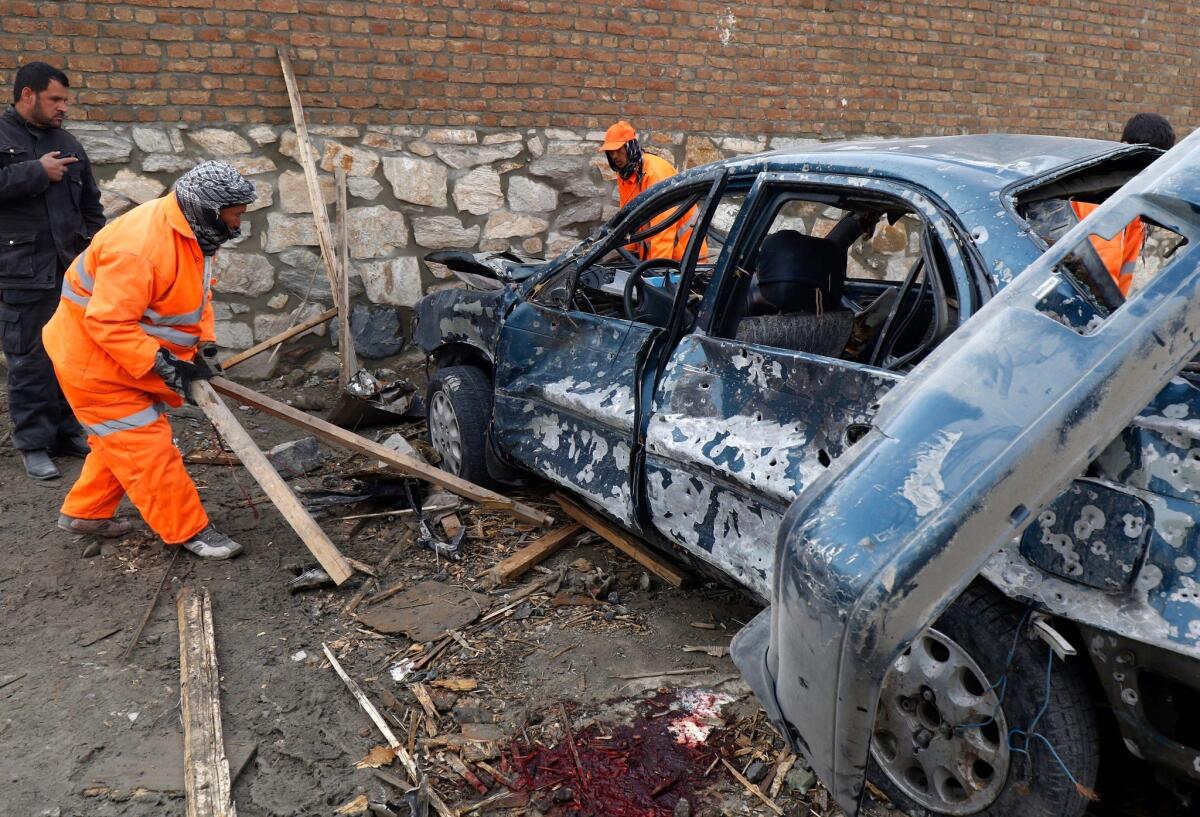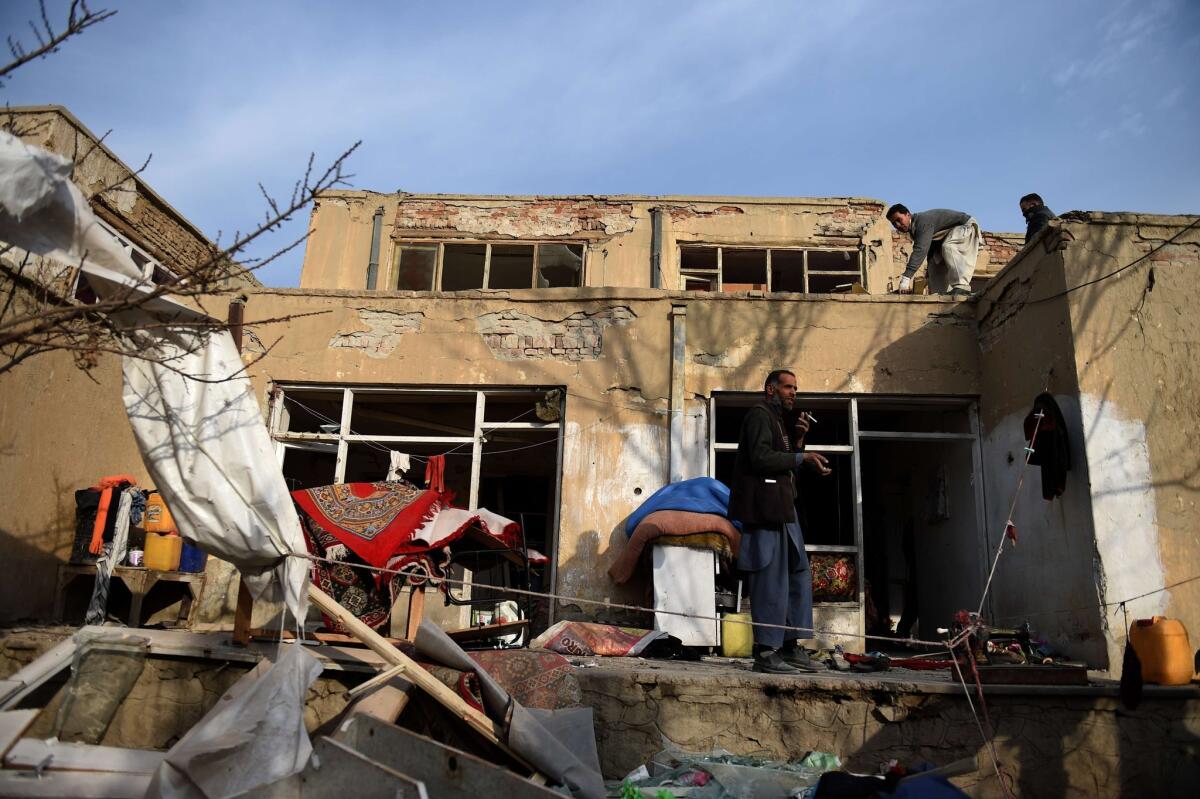Taliban target was a pricey French restaurant, but their victims were Afghans

Security officials inspect the site of a suicide bomb attack that targeted the French restaurant Le Jardin in Kabul, Afghanistan.
Reporting from Kabul, Afghanistan — Everyone on 9th Street in central Kabul’s Taimani neighborhood knew of the high-priced French restaurant that dominated their simple, unpaved road.
Few, if any, had ever glimpsed the sprawling garden and multicolored flowers that lay behind the mammoth iron gate of Le Jardin. They only saw the armored cars of foreign dignitaries and Afghan political elites who often dined there.
Residents viewed the restaurant not just as an eyesore, but as a threat to their lives and livelihoods — a target for insurgents who have attacked such foreigner-friendly establishments with increasing frequency in recent years. Le Jardin became the latest Friday evening when a Taliban militant detonated a suicide bomb outside the restaurant, killing two people, a security guard and a 12-year-old boy, and injuring 15 others.
Join the conversation on Facebook >>
“I remember when ambassadors and ministers would come — the whole street would be shut down by police,” recalled Massoud, 13, who said he had heard of threats being made against the restaurant.
After one of the several militant attacks on Kabul’s airport over the past few years, Massoud and the owner of another restaurant said, Le Jardin’s operators were told: “Leave, or we will do what we did to the airport to you.”
The Taliban made good on their threat, saying they had targeted a “restaurant of foreigners.” But residents said all of the victims were Afghan residents.
He was a kind, simple boy. He didn’t deserve to die like that
— Massoud, Kabul resident, on his friend, 12-year-old terror victim Baset
Among them was the 12-year-old boy, Baset, whom neighbors recalled fondly for his distinctive laugh. At the time of the bombing, Baset was standing outside a convenience store — made from a converted shipping container — a few feet from his family’s home.
Massoud said shrapnel struck his friend in the back of the head. He collapsed instantly.
“He was a kind, simple boy,” Massoud said. “He didn’t deserve to die like that.”
Massoud said he and his 7-year-old brother, Yousef, were among a group of boys who had been playing in the street just before the blast hit.
“Had our mothers not called us in, we would all be dead by now,” Massoud said.
For Afghans caught in ongoing violence between the Western-backed government of President Ashraf Ghani and an armed opposition led by the Taliban, the attack was a deadly reminder, if one was ever needed, of the deep uncertainty they still must live with, even in the capital city, 14 years after the U.S.-led military invasion.
Like several other high-priced eateries out of reach for the average Afghan — one-third of the country’s 30 million people live on less than $1 per day — Le Jardin was located in a residential area of Kabul. Local residents find themselves near the cross hairs of insurgents simply because of their proximity to establishments they know nothing about.
In January 2014, Taliban militants attacked a Lebanese restaurant that was a favorite among foreigners and wealthy Afghans, killing 20 people. Among the dead were 13 foreigners and seven Afghans, including two drivers who were killed as they waited outside the restaurant.
The security concerns — along with a stagnant economy and dwindling international military presence that has reduced their customer base — have caused nearly all of the restaurants that catered to expatriates and Afghan elites to close. To some Kabul residents, that has come as a relief.
Outside Le Jardin on Saturday afternoon, one angry resident in his 60s, his home nearly leveled by the blast, yelled: “It was a whorehouse! Why, why was it here in our neighborhood?”

Residents salvage appliances from their homes near the site of a suicide car bomb attack at Le Jardin, a French restaurant popular with foreigners in Kabul, Afghanistan.
One of the attackers was apprehended in a nearby alleyway after he tried to dispose of his weapon, police said. A second gunman was also arrested, interior ministry spokesman Sediq Sediqqi said Saturday. The third attacker was still at large.
While the Taliban claimed responsibility for the bombing in a statement, Sediqqi said authorities were still investigating which group carried it out.
A Twitter account purportedly belonging to the Taliban bragged after the attack: “Good omen for upcoming year as 2016 foundation stone set with spectacular fireworks.” Meanwhile the grieving family of Baset, the slain boy, must walk past shards of broken glass that line their once quiet street, and the crews working to repair the damage to their neighbors’ houses.
Latifi and Arsalai are special correspondents. Staff writer Shashank Bengali in Mumbai, India, contributed to this report.
ALSO
Saudi Arabia executes 47, including top Shiite cleric
After a year of disruption, China looks to 2016 with cautious optimism
Deadly attack on Indian air base is blamed on Pakistani militants, clouding peace talks
More to Read
Sign up for Essential California
The most important California stories and recommendations in your inbox every morning.
You may occasionally receive promotional content from the Los Angeles Times.










